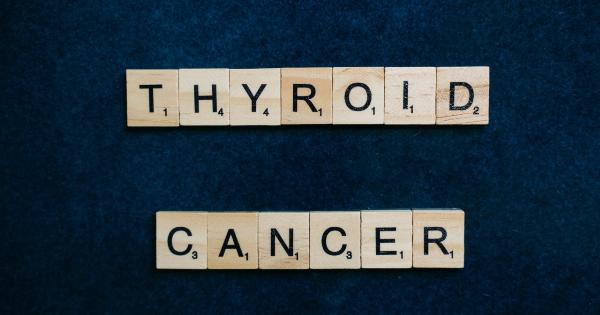The thyroid gland is a small butterfly-shaped gland located in the base of the neck, just below the Adam’s apple.
It is responsible for the production of hormones that regulate metabolism and control the rate at which the body uses energy.
Thyroid nodules are abnormal growths that form within the thyroid gland. These nodules are relatively common and, in most cases, are harmless.
However, in some cases, thyroid nodules may be cancerous, and it is essential to diagnose and treat them promptly.
Causes of thyroid nodules
The exact cause of thyroid nodules remains unknown, but some factors may increase the risk of developing them, including:.
- Being female — women are more likely to develop thyroid nodules than men.
- Being over the age of 60 — thyroid nodules are more common in older adults.
- Having a family history of thyroid nodules or thyroid cancer.
- Having a history of radiation exposure to the head and neck area.
- Having iodine deficiency.
- Having an autoimmune disorder that affects the thyroid gland, such as Hashimoto’s thyroiditis or Graves’ disease.
Symptoms of thyroid nodules
The majority of thyroid nodules don’t cause any symptoms and are discovered incidentally during a routine physical exam or imaging studies like an ultrasound, CT or MRI.
In some cases, symptoms may develop as the nodule grows and presses on surrounding tissues, when they become large enough, they may cause:.
- Difficulty swallowing (dysphagia) or breathing.
- Hoarseness or voice changes.
- Pain or discomfort in the neck.
- Swelling or an unusual lump in the neck.
- Changes in the appearance of the neck.
Treatment of thyroid nodules
The treatment of thyroid nodules depends on several factors, including the size and characteristics of the nodule, the presence or absence of symptoms, and the patient’s overall health status.
In most cases, small thyroid nodules do not require treatment, and the patient is monitored with periodic examinations and imaging studies.
If the nodule is significant or continues to grow, the doctor may recommend treatment, which may include:.
- Thyroid hormone therapy- Taking thyroid hormone replacement for an underactive thyroid gland makes nodules shrink.
- Radioactive iodine treatment- In radioactive iodine therapy, a patient swallows a pill that delivers a large dose of radiation that destroys the thyroid nodules’ cells.
- Surgery- In a thyroidectomy, the surgeon removes all or part of the thyroid gland and thyroid nodules. Surgery is reserved for the most advanced cases of nodules that have grown too large, have signs of cancer or cause symptoms.
Unusual growth in thyroid nodules despite treatment
In some cases, despite treatment, thyroid nodules may continue to grow, or new nodules may develop. This may indicate a more severe underlying condition, such as thyroid cancer.
In such cases, it is crucial to reevaluate the patient’s treatment plan and perform additional diagnostic tests to determine the cause of the unusual growth.
Diagnostic tests for thyroid nodules
Several tests are available to diagnose thyroid nodules and identify any underlying health conditions, including:.
- Blood tests – Blood tests are used to check thyroid hormone levels and identify the presence of thyroid antibodies.
- Fine-needle aspiration biopsy (FNAB) – The procedure involves a needle aspiration to remove a small sample from the thyroid nodules for examination under a microscope.
- Ultrasound – An ultrasound can pinpoint the size and location of the nodule and identify any other abnormalities in the thyroid gland and neck region.
Treatment of thyroid cancer
If thyroid cancer is detected, the treatment may involve surgery, radioactive iodine therapy, and thyroid hormone replacement therapy.
Surgery- Surgery is often required to remove the cancerous nodule or the entire thyroid gland, depending on the severity of the cancer and its spread.
Radioactive iodine therapy- The treatment involves taking radioactive iodine by mouth after surgery to kill any remaining cancer cells or thyroid nodules.
It’s essential to avoid close contact with people and minimize exposure to pets for a few days after radiation treatment.
Thyroid hormone therapy- Following surgery and radiation therapy, the patient may need to take thyroid hormone replacement medication to replace the lost thyroids’ hormone production.
Conclusion
Thyroid nodules are a relatively common condition, and most of them are harmless. However, in some cases, unusual growth in the nodules despite treatment may indicate the presence of thyroid cancer or other severe health conditions.
If you notice any unusual changes or symptoms in your neck area, such as swelling or lumps, it’s essential to visit a doctor to evaluate the underlying cause of the problem.




























